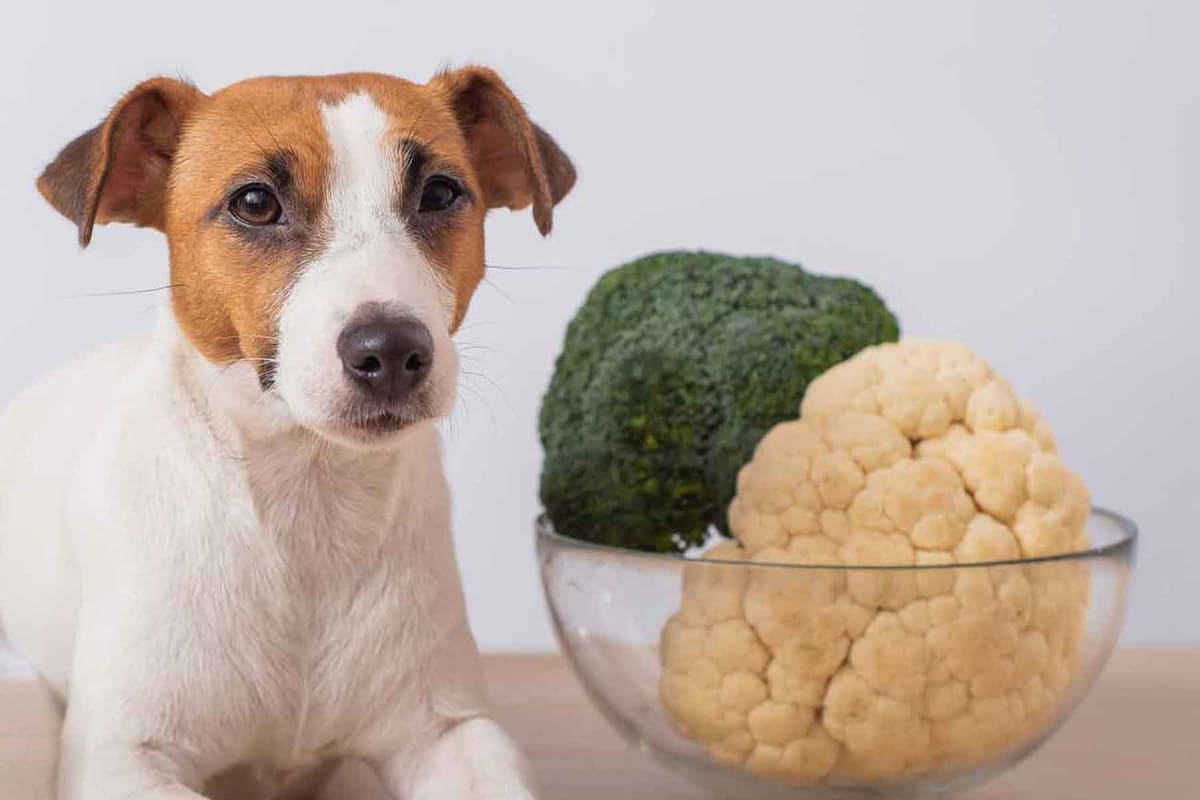
Can dogs eat cauliflower?
Can dogs eat cauliflower?
Can dogs have cauliflower?
If you've ever found yourself chopping cauliflower for dinner while your furry friend gives you those irresistible puppy eyes, you might have wondered: can dogs eat cauliflower?
The good news is yes, dogs can absolutely eat cauliflower! This cruciferous vegetable is non-toxic to dogs and can be a nutritious snack option. Unlike some human foods that are dangerous for dogs (like chocolate, grapes, or onions), cauliflower is generally safe for canine consumption.
Many dogs actually enjoy the mild taste and crunchy texture of cauliflower. It can be a wonderful low-calorie treat option, especially for dogs who need to lose weight. Let's explore everything you need to know about feeding this versatile vegetable to your four-legged friend.
Is cauliflower good for dogs?
Cauliflower isn't just safe—it's packed with nutrients that can benefit your dog's health. This versatile veggie contains vitamins K, C, and B6, as well as folate, fiber, and various minerals and antioxidants that help combat inflammation and support your dog's immune system and overall health.
The fiber in cauliflower promotes healthy digestion and can help dogs feel fuller longer, which is particularly beneficial for overweight dogs. Cauliflower is also low in calories but provides a satisfying crunch, making it an excellent alternative to high-calorie commercial treats.
It's particularly good for dogs who need to shed a few pounds but still deserve something special.
Can dogs eat raw cauliflower?
While dogs can technically eat raw cauliflower, it's not the best option for some pups, for several reasons:
Raw cauliflower can be harder to digest and may cause uncomfortable gas, bloating, or even digestive upset in some sensitive dogs.
Raw cauliflower presents a potential choking hazard, especially for smaller dogs or enthusiastic eaters who don't chew thoroughly. The firm texture can be difficult for some dogs to break down properly.
Raw cauliflower contains compounds called isothiocyanates that, in large amounts, can irritate your dog's digestive system. Cooking breaks down these compounds and makes the vegetable much easier on your dog's stomach.
If you do offer raw cauliflower to your dog, make sure to wash it thoroughly and cut it into small, bite-sized pieces to prevent choking.
How to prepare cauliflower for your dog
The best way to serve cauliflower to your dog is to steam, boil, or roast it without any added oils, salt, butter, or seasonings. Plain is always best when it comes to preparing vegetables for dogs.
To prepare dog-friendly cauliflower:
Wash the cauliflower thoroughly to remove any pesticides or dirt.
Cut it into small, bite-sized pieces appropriate for your dog's size.
Steam or boil it until soft but not mushy (about 5-7 minutes).
Allow it to cool completely before serving.
Never add garlic, onions, salt, or spices, as these can be harmful to dogs. Also skip the cheese sauce, butter, or oils that you might add to your own portion.
How much cauliflower can I feed my dog?
As with any treat, moderation is key. Cauliflower and other treats should make up no more than 10% of your dog's daily caloric intake. For most dogs, this means just a few small florets or less as an occasional treat.
Start with a very small amount—just a tiny piece or two—especially the first time you introduce cauliflower. This allows you to monitor for any adverse reactions or digestive upset.
Signs of cauliflower intolerance
While cauliflower is safe for most dogs, some may have trouble digesting it. If you notice any of these symptoms after feeding your dog cauliflower, it's best to discontinue offering this vegetable and consult with your veterinarian:
Excessive gas or flatulence
Bloating or abdominal discomfort
Constipation or diarrhea
Vomiting
Though rare, some dogs may have an allergic reaction to cauliflower. Watch for signs like itching, swelling, or gastrointestinal distress after feeding cauliflower for the first time. Contact your vet right away if you notice any of these or other concerning symptoms.
Other safe vegetables
Cauliflower isn't the only vegetable thats's safe for your dog to enjoy. There are several other dog-friendly options to add variety to your pup's treat rotation, including:
Carrots: Great for dental health and packed with beta-carotene
Green beans: Low in calories and high in fiber
Cucumber: Hydrating and refreshing, especially in summer
Pumpkin: Excellent for digestive health (plain, not pie filling)
Cooked sweet potato: Rich in vitamins and minerals when cooked thoroughly
As with cauliflower, always serve these vegetables plain, well-cooked, and cut into appropriate sizes for your dog. And remember, human food treats should be an occasional compliment to your dog's regular, well-balanced diet, not a replacement!